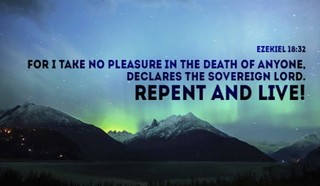
- Recent Translations
- All Translations
Ezekiel 18
Share
Settings
The Soul Who Sins Will Die
1 Then the word of the LORD came to me, saying,Images for Ezekiel 18

Ezekiel 18 Commentary
Chapter 18
God has no respect of persons. (1-20) The Divine providence is vindicated. (21-29) A gracious invitation to repentance. (30-32)
Verses 1-20 The soul that sinneth it shall die. As to eternity, every man was, is, and will be dealt with, as his conduct shows him to have been under the old covenant of works, or the new covenant of grace. Whatever outward sufferings come upon men through the sins of others, they deserve for their own sins all they suffer; and the Lord overrules every event for the eternal good of believers. All souls are in the hand of the great Creator: he will deal with them in justice or mercy; nor will any perish for the sins of another, who is not in some sense worthy of death for his own. We all have sinned, and our souls must be lost, if God deal with us according to his holy law; but we are invited to come to Christ. If a man who had shown his faith by his works, had a wicked son, whose character and conduct were the reverse of his parent's, could it be expected he should escape the Divine vengeance on account of his father's piety? Surely not. And should a wicked man have a son who walked before God as righteous, this man would not perish for his father's sins. If the son was not free from evils in this life, still he should be partaker of salvation. The question here is not about the meritorious ground of justification, but about the Lord's dealings with the righteous and the wicked.
Verses 21-29 The wicked man would be saved, if he turned from his evil ways. The true penitent is a true believer. None of his former transgressions shall be mentioned unto him, but in the righteousness which he has done, as the fruit of faith and the effect of conversion, he shall surely live. The question is not whether the truly righteous ever become apostates. It is certain that many who for a time were thought to be righteous, do so, ( ezekiel 18:26-27 ) sin is forgiven, it is blotted out, it is remembered no more. In their righteousness they shall live; not for their righteousness, as if that were an atonement for their sins, but in their righteousness, which is one of the blessings purchased by the Mediator. What encouragement a repenting, returning sinner has to hope for pardon and life according to this promise! In verse ( 28 ) is the beginning and progress of repentance. True believers watch and pray, and continue to the end, and they are saved. In all our disputes with God, he is in the right, and we are in the wrong.
Verses 30-32 The Lord will judge each of the Israelites according to his ways. On this is grounded an exhortation to repent, and to make them a new heart and a new spirit. God does not command what cannot be done, but admonishes us to do what is in our power, and to pray for what is not. Ordinances and means are appointed, directions and promises are given, that those who desire this change may seek it from God.
Ezekiel 18 Commentaries
Footnotes 1
- [a] Hebrew; LXX He withholds his hand from iniquity
Chapter Summary
INTRODUCTION TO EZEKIEL 18
This chapter contains an answer to an objection of the Jews to the dealings of God with them in a providential way. The objection is expressed in a proverb of common use among them, and complained of as being without cause, Eze 18:1,2; however, for the future, no occasion should be given them to use it; for, though God could justify his proceedings upon the foot of his sovereignty, all souls being his; yet he was determined none but the sinner himself should suffer, Eze 18:3,4; and puts various cases for the illustration and vindication of his proceedings; as that a just man, who is described by his proper characters, as abstaining from several sins specified, and doing what is right and good, should surely live, Eze 18:5-9; but that the son of such a just man, being the reverse of his father's character, should surely die, Eze 18:10-13; and again, the son of such a wicked man, observing the heinousness of his father's sins, and abstaining from them, though his father should die in his iniquities, he should not die for them, but live, Eze 18:14-18; by which it appears that the dealings of God with the Jews were not according to the proverb used by them, but quite agreeable to his resolution; that the sinner, be he a father or a son, shall die for his own sins; and that the righteous man's righteousness shall be upon him, and the wicked man's sin upon him, and accordingly both shall be dealt with, Eze 18:19,20; which is further illustrated by a wicked man's turning from his sinful course, and doing righteousness, and living in that righteousness he has done; which is more agreeable to God that he should live, and not die in sin, Eze 18:21-23; and by a righteous man turning from his righteousness, and living a vicious life, and dying in it, Eze 18:24; from both which instances this conclusion follows, that God is to be justified; and that his ways are equal, and the Jews' ways were unequal, and their complaint unjust, Eze 18:25; and the same instances are repeated in a different order, and the same conclusion formed, Eze 18:26-29; upon which the Lord determines to judge them according to their own ways, their personal actions, good or bad; and exhorts them to repentance and reformation; and closes with a pathetic expostulation, with them, Eze 18:30-32.